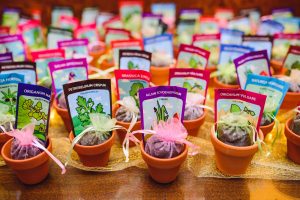Special Events Are Going GREEN!
Weddings aren’t always white. Sometimes they’re green.
Rehearsal dinners, baby showers and other celebrations are trending green, too.
Going green has little to do with color. It’s the concept of planning events that are special, yet environmentally sustainable.
“More venues are offering eco-friendly options,” said Lindsay Condelli, assistant facility events coordinator at Lewis Ginter Botanical Garden. The Garden is a Virginia Green certified location that observes sustainable practices. “Clients may not realize it, but their weddings and parties are green based on the venue they have chosen.”
For example, event locations with outdoor views require less money and time dedicated to one-use decor. Nature claims the spotlight, not costly decorations that are trashed a few hours later.
Another traditional decoration, the table centerpiece, is changing from big and elaborate to bold and beautiful, as well as potted. That’s why the 2019 Flower of the Year is a popular choice: the simple, yet stunning Dahlia. Colorful and plentiful, it blooms midsummer through the first frost, when many other plants are past their prime. Taking center stage with potted flowers are repurposed props, such as vintage books, votives and shabby chic decoratives.
Even guest favors are drifting toward sustainability.
“Couples are giving gifts that guests can actually use and enjoy, rather than a favor that will be thrown away a few days later,” Condelli said.
Caterers and chefs support stewardship and sustainability in creative ways, too.
“Hosts want unique Pinterest-worthy events and Instagram-able moments,” said Susan Hicklin, general manager for Meriwether Godsey catering. “They ask for fresh, colorful food and fun menus that are meaningful to them.” Hicklin shared that chefs sometimes recreate family recipes using fresh, organic ingredients. They also partner with local food sources whenever possible, which increases overall freshness and taste while reducing food miles.
Some caterers and restaurants go one step further. They grow their own vegetables and herbs on site.
Hicklin noted that food pairings are in flux, too. The traditional protein-centered plate—meat with two sides—has morphed into build-a-bowl and build-a-plate options. Event planners are choosing more plant-based items, such as nutritious grains, greens, and vegetables.
“Our chefs use formulas to calculate food prep and minimize waste,” Hicklin noted. “We also remind clients that buffets can be wasteful.”
Health codes restrict the use of leftovers, but preparation scraps are put to good use.
“Since our catering operation is at Lewis Ginter, we save our fruit peelings for compost that’s used in the Community Kitchen Garden, and the butterflies love them,” Hicklin said.
“The worms love all our coffee grounds, too.”
Eco-Event Tips

These guest favors distinctively plant the seed to support the green movement. Image by Emily Marie Photography
The following are simple ways to make special events eco-friendly.
- Props: Rely on natural settings for inherent beauty, instead of spending money on greenery boughs and cut flowers that don’t last.
- Invitations: Send invites electronically to save money – and trees. This practice eases RSVP management, too.
- Signage: Replace custom-printed, one-use signs with chalkboards and generic signs provided by the caterer.
- Centerpieces: Replace elaborate cut-flower centerpieces with live, potted plants. After the special event, recycle the plants as gifts for helpers and relatives or share with hospitals and retirement centers.
- Plates and cutlery: Use compostable products if china, glass and silver are not feasible.
- Meals: Consider creative grazing stations, since buffets incur waste.
- Cakes: Replace the multi-tiered, often uneaten wedding cake with a one-layer cutting cake. Offer guests more popular options, such as donuts, macaroons, popsicles or nutritious cheese-towers garnished with fresh fruits.
- Water: Set up infused water stations instead of using individual plastic bottles.
- Alcoholic beverages: Reduce carbon footprint by selecting locally produced beers and Virginia wines, and order refillable kegs to avoid aluminum cans. Creatively garnish cocktails and mocktails with fresh herbs.
- Guest Favors: Replace plastic and other throwaway mementos with useful gifts, such as live succulents or seed packs for planting. Or, give edibles: small containers of organic honey, local jam or flavored popcorn.
- Grand exits: Ask the florist to save petals from spent flowers or dry lavender sprigs for guests to throw as the wedding couple departs.
This article first published in the Richmond Times-Dispatch in June 2019.
